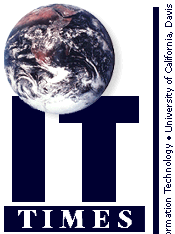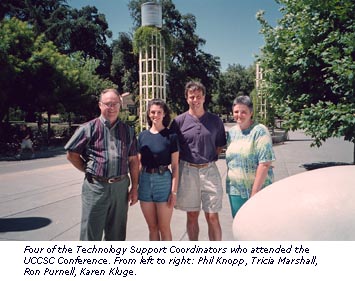
Scholarship Recipients Attend Technology Conference
Seven campus members enrolled in the Technology Support Program (TSP) were awarded scholarships by Information Technology to attend the 11th annual University of California Computing Services Conference (UCCSC) at UC Santa Cruz from June 30 through July 2. The purpose of the conference was to provide computing professionals from all nine UC campuses with the opportunity to meet and discuss computing support issues and strategies."The conference is a meeting of our peers," said Pat Kava, manager of IT Client Services, which administers the Technology Support Program. "It provides a valuable forum for exchanging ideas that have worked within the UC structure, and it's small enough to allow personal interactions to take place. That means Technology Support Coordinators (TSCs) and IT staff can meet each other and talk about local issues in a companionable atmosphere."
"Perhaps the most important aspect of the conference is that department technical support people come back with a greater awareness that UC Davis is doing things right and is actually in the forefront of the ways campuses support technology in higher education," Kava said.
Five of the scholarship recipients agreed to share their perspectives on the conference.
Phil Knopp, Internal Medicine, UC Davis Medical Center:
The conference began with group sessions, in which computing subjects common to all campuses were presented. First came presentations from representatives of the Office of the President on the California Digital Library and the Authentication Workgroup, then a series of group discussions that concerned site licensing of software, wireless connectivity, Web site construction, and email policy, among other topics. Finally came seminars on subjects such as spam, call tracking, and data projection. And this was just the first day!The following day was made up of four more sets of seminars, ranging from databases on the Web, the CBT (Computer Based Training) rollout throughout the University, Year 2000 compliance, Microsoft NT support issues, campus-wide scheduling and calendaring, and many other issues. In all, it served up a pretty heavy helping of computer-related issues faced every day on campus. UC Davis as compared to other campuses is doing quite well. To our credit, we have rolled out both CBT and DaFIS, a major financial tracking system, upgraded email servers, and led the way to handling Year 2000 compliance. I think we are setting a leading example in these areas, and while we all have a way to go, the campus computing staff at Davis is meeting the challenges head on.
Bill Heekin, University Extension:
The conference provided an excellent opportunity to share computing developments and hindrances on multiple levels — campus-, department-, and system-wide. As one of over 30 computer support staff from UC Davis who attended, I participated in sessions that related to real-world situations in my departmental computing environment, including Windows NT Support, Remote Access Options, Help Desk Performance, Launching CBT Training, and Software Site Licensing. While the conference locale was great, it was incidental to the opportunity to discuss computing support concerns and to network with staff from other campuses and departments. I was particularly impressed by the number of sessions led by the UC Davis Information Technology/Information Resources staff (UCD appears to be ahead of the curve in many areas). In addition, the conference was an opportunity for me to have several educational conversations with the UCD Information Technology Client Services staff.

Karen Kluge, Planning & Budget Office:
Attending UCCSC afforded me the opportunity to expand my perspective and to realize that those of us developing applications and supporting users on the various UC campuses face many of the same challenges, but have not all chosen to implement the same solutions. I found it very instructive to hear what my counterparts at other campuses have tried, what they liked, and what they didn't like. I was pleased to learn that UCD has a reputation among the other campuses as a positive role model in many areas of information technology. And it was equally interesting to be challenged when I discussed approaches that we seem to take for granted locally, that we consider status quo, but others regard differently.
Tricia Marshall, Division of Education:
The most obvious benefit of the conference is learning about current computing issues at each of the campuses. But the intangibles are even more beneficial — such as meeting other technical support personnel to exchange ideas and solutions.In my opinion, one of the most interesting uses of technology by one of the UC campuses is UC San Diego's internally developed GenericLink. GenericLink is a Web application development tool intended to give all of the campus Web-based applications a consistent look and feel. The Web-based engine was designed to be easy for non-programmers to use, and has already been used to develop such applications as StudentLink, TravelLink, EmployeeLink, FinancialLink, and DataLink. Making each of these applications Web-based means that they work on any platform with a Web browser, thereby avoiding platform compatibility problems such as those faced by users of the Financial Information System at UC Davis (DaFIS).
For an overview of GenericLink, see https://mendel.ucsd.edu/cgi-bin/genericlink.pl/901502695/Node59694.
Ron Purnell, Mechanical and Aeronautical Engineering:
It was reassuring to learn that staff at all nine UC campuses is grappling with many of the same issues that we are, and hearing ideas and solutions from our peers at other campuses was a valuable experience. Because Network 21 was delayed for a year and we had just finished the first year of implementing a new financial system (DaFIS) and the inherent difficulties of such a large change, I went to the conference wondering how well UCD would stack up against the other campuses in terms of our computing environment. I came away feeling we were among the best. We are doing more with remote access (RAMP), dormitory connectivity (ResNet), staff computing support (TSP), and advanced email services (IMAP servers) than many of the other campuses. I especially enjoyed learning that UC Davis leads the way in CBT (Computer Based Training). Other campuses are getting started with it, but the offerings we have here are tremendous.The 1998 University of California Computing Services Conference Web site is at http://www2.ucsc.edu/uccsc/.
Next year's conference will be held at UC Santa Barbara, in late June or early July.
Read the Top Ten Reasons to Join the Technology Support Program.